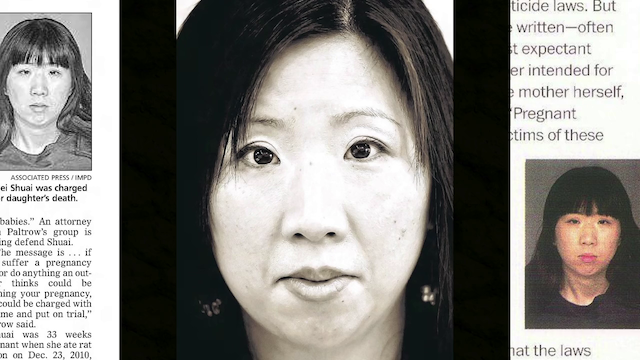A pregnant young woman finds herself at an impossible crossroad. Abandoned by her boyfriend and left alone in a foreign country, growing ever more depressed as the due date for pregnancy approaches, she sees her options slowly vanish. She has grown distant with her friends and family. She’s is as desperate as anyone in her place can be, seeing only one alternative ahead of her: suicide. But as fate would have it, the ingested rat poison fails to kill her and takes only her unborn baby. The question now is: will the state of Indiana (a rather conservative state with strong ‘fetal homicide’ laws) convict her of murder?
With a documentary that was years in the making (and only completed after a successful Kickstarter campaign), filmmakers Marion Lipschutz and Rose Rosenblatt present the riveting case of Bei Bei Shuai, a Chinese immigrant living in Indianapolis who was the first woman in the state to be charged with feticide because of a failed suicide attempt. Lipschutz and Rosenblatt began filming Bei Bei after her release from prison on bail – a bail she was initially denied, leaving her locked up for 435 days – along with her lawyer, Linda Pence, as they both fight for Bei Bei’s freedom. Far more than the trial of a single individual, Bei Bei’s case has rippling implications. As Linda puts it, a guilty verdict will set a dangerous precedent for the rights of women in the state and perhaps the whole country.
Bei Bei employs a rather straightforward narrative structure for a documentary of its type. It begins with Bei Bei trying to restart her life out of jail, rebuilding her confidence as well as her case against the state prosecutor. She rents a new apartment, gets her job back, reconnects with old friends – anything to make her experience a semblance of her former existence and freedom. Yet we are soon reminded through her lawyer, Linda Pence, that as long as her case is still pending, Bei Bei’s freedom is only temporary. She was released on bail and under severe restrictions. We proceed through the film by slowly learning more and more about Bei Bei’s story, her past life, her ex-boyfriend/fiancé, the manner and circumstances of her attempted suicide, and the exact legal ramifications that she faces. Linda Pence, who shares as much screen time as Bei Bei (if not more), does most of the heavy lifting in the complex legal and political explanations required to understand the case. Time passes, seasons and haircuts change, and the long struggle ensues. We begin to realize the socio-political significance of Bei Bei’s trial.
The topic of women’s reproductive rights in the US is riddled with controversy and divisiveness for anyone who lives here. Clips of George W. Bush, Mike Pence, and other state representatives in the film show us how the laws have changed, gradually shrinking the rights of women in many states. Soon, another key player, Terry Curry, is introduced as the county’s prosecutor. He supports Bei Bei as a private citizen, but because Indiana state legislature is clear on the subject of feticide, he feels he must proceed with the charge. And, of course, there’s an election coming and he does not want to lose his conservative crowd. The documentary does a great job at keeping all these threads in line and presenting the socio-political arguments with astounding clarity. The more we get into it, the more we find that Bei Bei’s case is far more complicated than what the prosecutor presents. A myriad of external and opposing factions are exerting their influence. As one state senator of Indiana puts it, “[Miss Shuai] is an unfortunate pawn in an ongoing ideological conflict… a proxy war.”
Nevertheless, Linda and the rest of her defense team manage to cut through the legal clutter and make a plea deal with the prosecutor (Linda’s reaction in this scene is priceless). Bei Bei’s story ends on a happy note, and through her all women whose rights are at risk feel vindicated. Or do they?
Well, one can’t say for sure. The documentary is too focused on the legal and political side of things, to stop and examine Bei Bei’s actions and make a case for her rights. And when it does, it is so fleeting that it gets lost in the minutiae. The filmmakers hope – perhaps justly so – that Bei Bei will become a symbol of her cause, leading by example. Yet, that hope begins to falter when we find that Bei Bei gets off on a technicality, in the end proving nothing.
Bei Bei presents an astonishing case that everybody needs be familiar with, regardless of political affiliation. The journey of this unfortunate woman is bound to tear at your heartstrings. As a piece of political activism, on the other hand, the documentary’s powers of persuasion and argument leave a bit to be desired. I imagine it is unlikely to change anyone’s mind or appeal to many who don’t already agree with the filmmakers’ perspective.
Bei Bei is showing at CAAMFest 2019 on May 10 and 14.
John Atom

Comments
Post a Comment